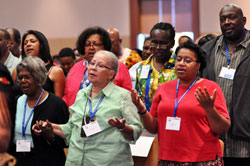Cardinal affirms black Catholic experience in the U.S.

Opal Easter-Smith, from left, Margo Butler and Adrienne Curry from the Archdiocese of Chicago pray during the National Black Catholic Congress Mass on July 20 in Indianapolis. During the congress, Benedictine Father Cyprian Davis of Saint Meinrad Archabbey in St. Meinrad was honored with a lifetime achievement award. (Photo by Mary Ann Garber) Click for a larger version.
By Mary Ann Garber
“The black Catholic experience in the United States is very important,” Cardinal Daniel N. DiNardo, archbishop of Galveston-Houston, told National Black Catholic Congress participants during his homily on July 20 in Indianapolis.
“It has a richness of both action and contemplation,” he said. “It has survived much and done much.”
Faith “is a gift that’s given” by God, Cardinal DiNardo said, “but you need some discipline. You need some work. You need some witness. It’s called ‘being engaged.’ ”
That requires “total trust in the Lord,” he said. “We need basic theology. We need to have words for our faith. … Powered by the grace of God, we commit ourselves to conversion and holiness of life.”
As national chairman of the U.S. bishops’ Pro-Life Activities Committee for three years, Cardinal DiNardo asked the congress participants to “remember the human person in the beginning stages when that [unborn] person may not have a name, and at the end stages when that person may have forgotten [his or her] name. Please don’t forget their names.”
Addressing vocations in the black community, he emphasized that, “For the sake of the Catholic Church in the United States and in your own community, … we need more priests and religious that are African-American. … We need joyful priests, and we need you, God’s holy people, to not be afraid to approach our young people” about vocations to the priesthood or religious life.
(Related stories: Black Catholic groups affirm liberating power of the Gospel in the African-American community | Comments still being accepted for National Black Catholic Congress Pastoral Plan of Action)
During a break in the congress programs on July 19, Bishop Joseph N. Perry, auxiliary bishop of Chicago, noted that Christ is “the glue that keeps us together” in a very diverse Church.
“Africans have been part of the Church since apostolic times, ever since Philip baptized the Ethiopian,” he said. “In the early centuries of the Church, it was very vibrant in North Africa. … I hope people [today] will take to heart the faith experience of their brothers and sisters who are of a darker complexion, and have the courage to delve into that.”
Bishop Perry said his prayer for the congress is that “we take what we have seen and heard, and go back to our communities and let them know that we have to build up our Church—our African-American Church, our black Church—so that we can continue to be a part of the broader Church, and let the Church know that we’re here, that we’re alive.”
The African-American culture has “been vibrant for hundreds of years,” he said. “But I think we need to constantly build that hope and build that faith, and continue to use the talents that we’ve been given, the faith that we’ve been given, as African-Americans to help the Church stay alive, to help enculturate the Church, to help make the Church a little more brown and be a part of the universal Church.”
University of Notre Dame graduate student Nicole Windmon of Coconut Creek, Fla., took a break from studying for her Ph.D. in organic chemistry to participate in the National Black Catholic Congress.
She currently lives in Mishawaka, Ind., near the university, is a member of St. Pius X Parish in Granger, Ind., and is discerning a call to religious life.
“I liked it when Cardinal DiNardo asked the young people to open their hearts to God’s call,” Windmon said after the Mass on July 20. “I think that’s exactly what happened to me. I was at a point in my life when I was completely open to God, and I just started feeling like God was calling me to be in service to the Church. I didn’t know what that meant so I enlisted the help of a spiritual director.”
In July, she took time from her studies to participate in a silent retreat at a Franciscan community’s motherhouse.
“I wanted to look back at my life and see how God led me to this point,” Windmon said, “and just be thankful for everything that God has given me.”
Carrie Stivers participated in the congress with a group of parishioners from St. Joseph Proto-Cathedral in Bardstown, Ky., in the Archdiocese of Louisville.
“I think we’re heart people,” Stivers said on the opening day of the congress. “… We have the spirit. Our young people are really catching on. They will do what they see done, and we have to be an example for them. … Our parents held on to their faith and we learned it from them. And we learned to have hope for a better future as black Catholics.”
Holy Angels parishioner Lori Wright of Indianapolis entered into the full communion of the Church in 2001, and was excited about participating in the national congress on July 19.
For “those of us that are here [from parishes in the archdiocese], whether we’re singing in the choir or volunteering to do other things,” Wright said, “there is a sense of pride that says, ‘Welcome to our home.’ ”
(Criterion reporter Sean Gallagher contributed to this story.) †
